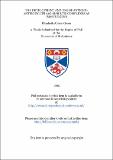Files in this item
The development and use of antigen-antibody-LTB (Ag-MAb-LTB) complexes as immunogens
Item metadata
| dc.contributor.advisor | Randall, R. E. | |
| dc.contributor.author | Green, Elizabeth Allison | |
| dc.coverage.spatial | 222 p. | en_US |
| dc.date.accessioned | 2018-06-13T08:38:29Z | |
| dc.date.available | 2018-06-13T08:38:29Z | |
| dc.date.issued | 1995 | |
| dc.identifier.uri | https://hdl.handle.net/10023/13984 | |
| dc.description.abstract | In the course of this work a novel strategy has been developed for linking the adjuvant Escherichia coli heat-labile enterotoxin subunit B (LTB) to Simian Immunodeficiency Virus (SIV) proteins via an antibody bridge and the systemic and mucosal immunogenicity of such SIV-MAb-LTB complexes have been investigated. A short peptide tag, termed Pk, was joined to the 3'-end of the gene coding for LTB and expression studies revealed that the gene product, LTB-Pk, could be efficiently synthesised and secreted from non-pathogenic Vibrio sp.60. Analysis of the functional properties of LTB-Pk demonstrated that LTB-Pk , like native LTB, was a heat-labile oligomer, that could bind to the glycolipid GM1-ganglioside and was immunogenic in vivo. In attempts to purify LTB-Pk for immunisation studies, both hydrophobic and ion-exchange chromatography schedules were analysed, the latter procedure being more efficient. Strategies were developed for joining LTB-Pk to one arm of an anti-Pk MAb, (MAb SV5-P- k) and Pk-linked SIV proteins to the other arm, and such SFV-MAb-LTB complexes bound to GM1 -ganglioside in vitro. Systemic immunisation studies suggested that SIV-MAb-LTB complexes, using recombinant p17 as the target antigen, promoted both humoral and cell- mediated immunity to the recombinant p17. In addition, it was later shown that conjugation of LTB-Pk to recombinant SIV proteins via an antibody bridge, resulted in a more efficent presentation of the recombinant SIV protein to the immune system, than co-administration of LTB-Pk with the recombinant SIV protein. However, intranasal administration of p17-MAb-LTB complexes did not induce immunity to recombinant p17. Subsequently it was shown that the recombinant p17 was highly susceptible to mucosal degradation, suggesting the poor mucosal immunogenicity of p17-MAb-LTB complexes may be related to the instability of recombinant p17 in the mucosal environment. Further investigations into the stability of other recombinant SIV proteins in the mucosa, revealed that recombinant p27 was more resilient to mucosal degradation. p27-MAb-LTB complexes were constructed and initial intranasal immunisation studies revealed that both systemic and cell-mediated immunity to recombinant p27, could be induced following intranasal administration. Furthermore, mucosal immunity to recombinant p27 was evident in the lungs of vaccinated mice, with anti-recombinant p27 IgG-secreting cells predominating. | en_US |
| dc.language.iso | en | en_US |
| dc.publisher | University of St Andrews | |
| dc.subject.lcc | QR187.L5G8 | |
| dc.subject.lcsh | Leucocyte adherence inhibition test | en |
| dc.title | The development and use of antigen-antibody-LTB (Ag-MAb-LTB) complexes as immunogens | en_US |
| dc.type | Thesis | en_US |
| dc.contributor.sponsor | Medical Research Council (MRC) | en_US |
| dc.type.qualificationlevel | Doctoral | en_US |
| dc.type.qualificationname | PhD Doctor of Philosophy | en_US |
| dc.publisher.institution | The University of St Andrews | en_US |
This item appears in the following Collection(s)
Items in the St Andrews Research Repository are protected by copyright, with all rights reserved, unless otherwise indicated.

